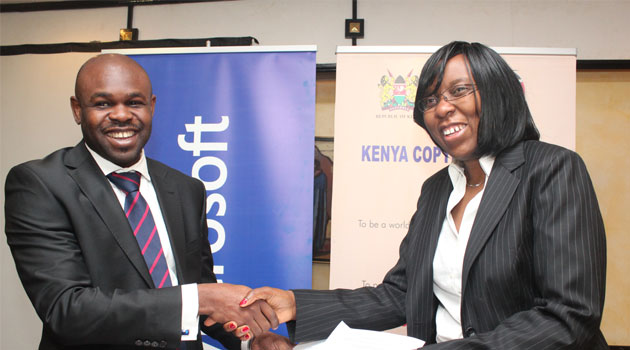The amnesty will run for six weeks until January 15 after which the company in conjunction with the Kenya Copyright Board (KECOBO) will conduct a joint raid and arrest organisations that are not using genuine software. NAIROBI, Kenya, Nov 28 – Microsoft Kenya has declared amnesty to people using unlicensed Microsoft software in the country to enable them acquire genuine software.
NAIROBI, Kenya, Nov 28 – Microsoft Kenya has declared amnesty to people using unlicensed Microsoft software in the country to enable them acquire genuine software.
Microsoft Kenya Country Manager Kunie Awosika says the company is losing billions to pirated software usage with about 78 percent of the Kenyan market using counterfeit products.
“Seventy-eight percent of Kenya is pirated, even if you reduce that to five percent, the impact of the economy will be huge, we are losing billions to this and it must now be addressed,” he said.
Awosika said already the company has written warning letters to over 200 small and medium size companies who are using unlicensed Microsoft products.
“During this amnesty we also have 10 to 15 percent of offer on Windows 8, Office 2013 and Office 365 which runs until December 31 2013,” Awosike said.
The company will also track individual who are using unlicensed software and put them to question.
“There are activation keys for every software and with the activation keys we are able to track the use of software and if we find out that there is someone who is using it we will deal with it,” he said.
He said that the company will also be dealing with resellers that bring in the counterfeit softwares.
The company has also signed a memorandum of understanding with KECOBO that will see the two organisations work together in bid to fight piracy in the country.
The partnership will enable them work together to activate continuous programmes and campaigns for educating the public on the risks and penalties associated with infringement of software copyrights and trademarks.
Speaking during the signing of a Memorandum of Understanding (MoU) between the two organizations, KECOBO Executive Director Marisella Ouma said the partnership will enable them work together to activate continuous programmes and campaigns for educating the public on the risks and penalties associated with infringement of software copyrights and trademarks.
“We want to educate Kenyans on the benefits of genuine software to businesses in terms of reliability and security as well as other associated risks for businesses and consumers when using counterfeit software,” she said.
The three year deal will see Microsoft support KECOBO to acquire the necessary skills and tools to assist in the fight against piracy and help to reduce software piracy as well as spur economic growth in Kenya.
The two organizations will also invest in training of journalists, software reseller channels and government procurement managers in order to create awareness around the effects and dangers of pirated or counterfeit software.
The move will also see consumers get free education on the importance of protecting Intellectual Property Rights and also protect them from unfair and misleading market conduct, specifically with regard to software piracy.
“Millions of shillings are lost every year through pirated software in our markets. When Intellectual Property Rights are infringed, software developers and other creative authors, as well as entrepreneurs who rely on income from solutions they have created suffer immensely as they cannot earn from their work,” said Daniel Kamau, Microsoft’s Anti-piracy lead for the West, East and Central Africa Region.
Kamau also noted that Microsoft and KECOBO will run a joint Public Relation (PR) campaign to keep the public informed on the importance of intellectual property protection as well as empower institutions that are involved in the protection of intellectual property.
The move comes in at a time when International Data Corporation (IDC) has released its 2013 research of cyber security and software piracy globally which depicts that a third of all PC software globally have pirated software.
The study also estimates direct business losses as a result of use of counterfeit software will hit USD114 billion this year and places potential losses from data breach at USD350 billion.


































